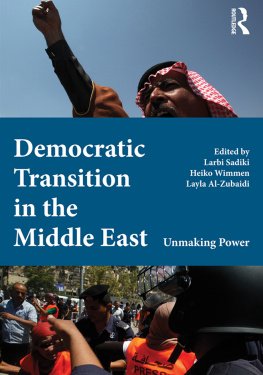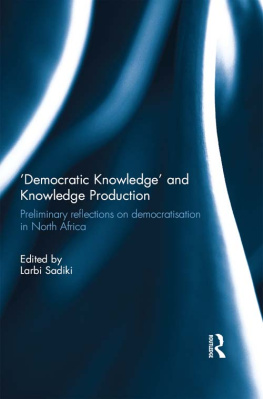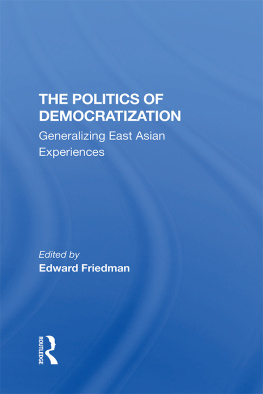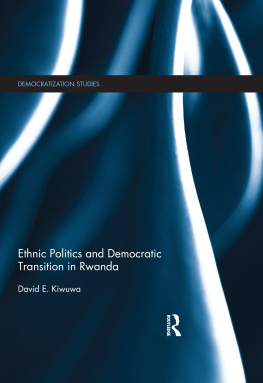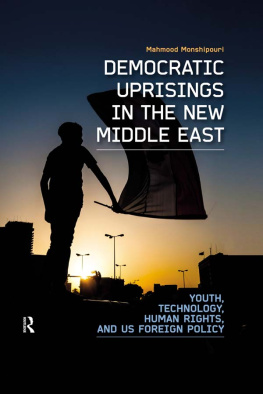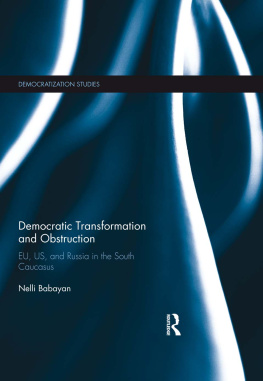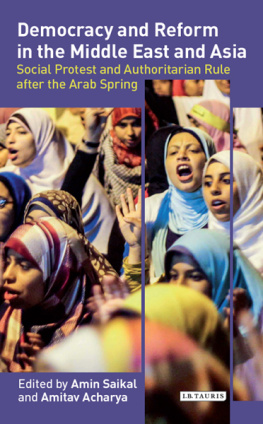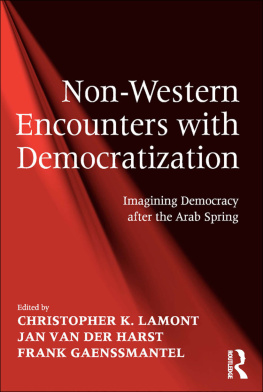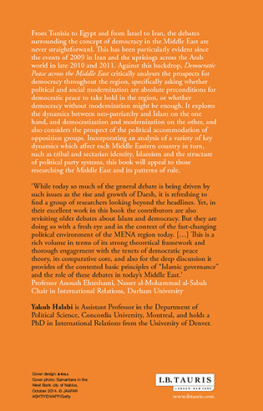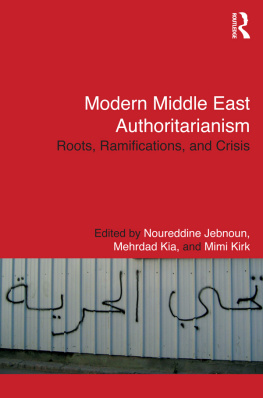Democratic Transition in the Middle East
Popular uprisings and revolts across the Arab Middle East have often resulted in a democratic faragh or void in power. How society seeks to fill that void, regardless of whether the regime falls or survives, is the common trajectory followed by the seven empirical case studies published here for the first time. This edited volume seeks to unpack the state of the democratic void in three interrelated fields: democracy, legitimacy and social relations. In doing so, the conventional treatment of democratization as a linear, formal, systemic and systematic process is challenged and the power politics of democratic transition reassessed.
Through a close examination of case studies focusing on Yemen, Syria, Egypt, Bahrain, Iraq and Lebanon, this collection introduces the reader to indigenous narratives on how power is wrested and negotiated from the bottom up. It will be of interest to those seeking a fresh perspective on democratization models as well as those seeking to understand the reshaping of the Arab Middle East in the wake of recent unrest.
Larbi Sadiki teaches courses on Arab and Middle Eastern democratization at the University of Exeter.
Heiko Wimmen is a Doctoral Candidate at Freie Universitt Berlin and a Fellow at the German Institute for International and Security Studies in Berlin.
Layla Al-Zubaidi is Director of the Southern Africa Office of the Heinrich Bll Foundation in Cape Town.
Democratic Transition in the Middle East
Unmaking power
Edited by
Larbi Sadiki,
Heiko Wimmen and
Layla Al-Zubaidi
First published 2013
by Routledge
2 Park Square, Milton Park, Abingdon, Oxon OX14 4RN
Simultaneously published in the USA and Canada by Routledge
711 Third Avenue, New York, NY 10017
Routledge is an imprint of the Taylor & Francis Group, an informa business
2013 Larbi Sadiki, Heiko Wimmen and Layla Al-Zubaidi, selection and editorial matter; individual chapters, the contributors
The right of the editors to be identified as the authors of the editorial material, and of the authors for their individual chapters, has been asserted in accordance with sections 77 and 78 of the Copyright, Designs and Patents Act 1988.
All rights reserved. No part of this book may be reprinted or reproduced or utilised in any form or by any electronic, mechanical, or other means, now known or hereafter invented, including photocopying and recording, or in any information storage or retrieval system, without permission in writing from the publishers.
Trademark notice: Product or corporate names may be trademarks or registered trademarks, and are used only for identification and explanation without intent to infringe.
British Library Cataloguing in Publication Data
A catalogue record for this book is available from the British Library
Library of Congress Cataloging in Publication Data
Democratic transition in the Middle East : unmaking power / edited by
Larbi Sadiki, Heiko Wimmen & Layla Al-Zubaidi.
p. cm.
Includes bibliographical references and index.
1. DemocratizationMiddle East. 2. Middle EastPolitics and
government1979- I. Sadiki, Larbi. II. Wimmen, Heiko. III. Al-Zubaidi,
Layla.
JQ1758.A91D463 2012 |
320.956dc23 | 2012017776 |
ISBN: 978-0-415-50567-3 (hbk)
ISBN: 978-0-415-50568-0 (pbk)
ISBN: 978-0-203-08285-0 (ebk)
ISBN: 978-1-136-18166-5 (epub)
Typeset in Times New Roman
by Taylor & Francis Books Limited
Contents
Contributors
Mona Abaza is Professor of Sociology at the American University in Cairo. She was a Visiting Professor at Lund University, as well as in Singapore, Paris, Kuala Lumpur, Leiden and Wassenaar. She was also a Fellow at the Wissenschaftskolleg in Berlin. Her most recent publications include Twentieth Century Egyptian Art: The Private Collection of Sherwet Shafei (AUC Press, 2011), The Changing Consumer Culture of Modern Egypt: Cairos Urban Reshaping (Brill/AUC Press, 2006) and Debates on Islam and Knowledge in Malaysia and Egypt: Shifting Worlds (Routledge Curzon Press, 2002).
Samer N. Abboud is Assistant Professor of International Studies at Arcadia University in Philadelphia. He received his doctorate in Arab and Islamic Studies at the University of Exeter, where he completed a dissertation entitled The Political Economy of Marketisation in Syria. In addition to journal articles and book chapters relating to economic policy in Lebanon, Iraq, Syria and the Gulf Cooperation Council, he is currently working on a manuscript entitled Neoliberalism, Privatisation, and Political Change in the Arab World.
Muhammad alZekri is a Lecturer and Post-doctoral Research Fellow at the International Graduate School of Heritage Studies, BTU Cottbus in Germany. He was until very recently Director of the Centre for Cultural Diversity in Bahrain. He obtained a Ph.D. in Cultural Anthropology in 2005 from the University of Exeter in England. In addition to his contributions to the Gulf Region section of the 1000 Women for the Nobel Prize, he has been publishing a fortnightly book review column in the popular Bahraini newspaper Akhbar al-Khaleej. He is currently working on a book entitled Majalis of Bahrain: Sites of Religio-cultural Negotiation.
Alia Mossallam is a Ph.D. Candidate at the London School of Economics and Political Science, looking at the peoples history of Nasserist Egypt, namely the experiences of the builders of the high dam and the resistance in Port Said in Suez in 1956 and 1967. Her academic work has focused on oral history and the people behind the movements that have shaped Egyptian history. When she is not writing or protesting, Ms. Mossallam works with the youth of marginalized communities in Egypt and Lebanon using different forms of art.
Khalil Osman is a journalist and writer, working in and on the subject of Iraq. He has taught politics at Indiana University in the United States of America. He has reported from North America, Europe, Africa, and several countries in the Middle East including Iraq, Lebanon, Syria, Jordan, the UAE and Bahrain, working for media organizations such as the British Broadcasting Corporation (BBC), Radio Free Europe/Radio Liberty (RFE/RL) and Radio Canada International (RCI). He is currently working on a book on Iraq.
Britta Rudolff serves as Managing Director at think heritage!, a cultural heritage think tank based in Bahrain. She is also Associate Post-Doctorate Researcher for Islamic Heritage Studies as well as Lecturer at the International Graduate School for Heritage Studies at the Brandenburg University of Technology in Cottbus, Germany. She has a background in Heritage Conservation, World Heritage Studies and Cultural Geography, with a particular focus on the Arab Middle East. Ms. Rudolff has worked for various international organizations in the cultural heritage field. Her most recent book publication is Intangible and Tangible Heritage: Topology of Culture in Contexts of Faith (2010).
Ahmed A. Saif earned his Ph.D. in Politics from the University of Exeter in 2000. He is currently the Director of the Sheba Centre for Strategic Studies, Associate Dean at the Yemen College of Middle Eastern Studies and Associate Professor of Politics at Sanaa University in Yemen.

